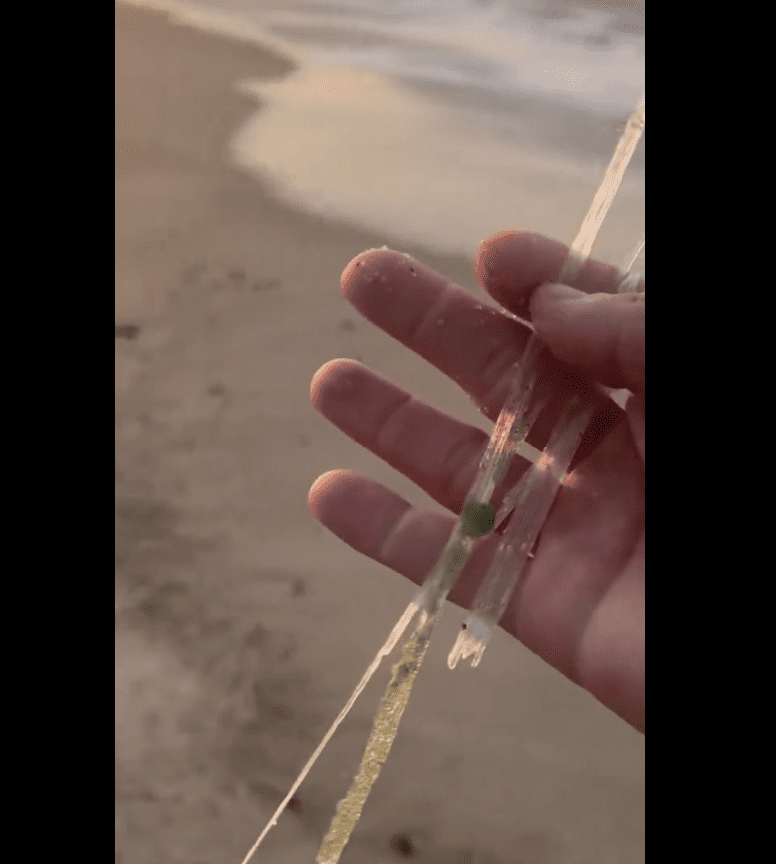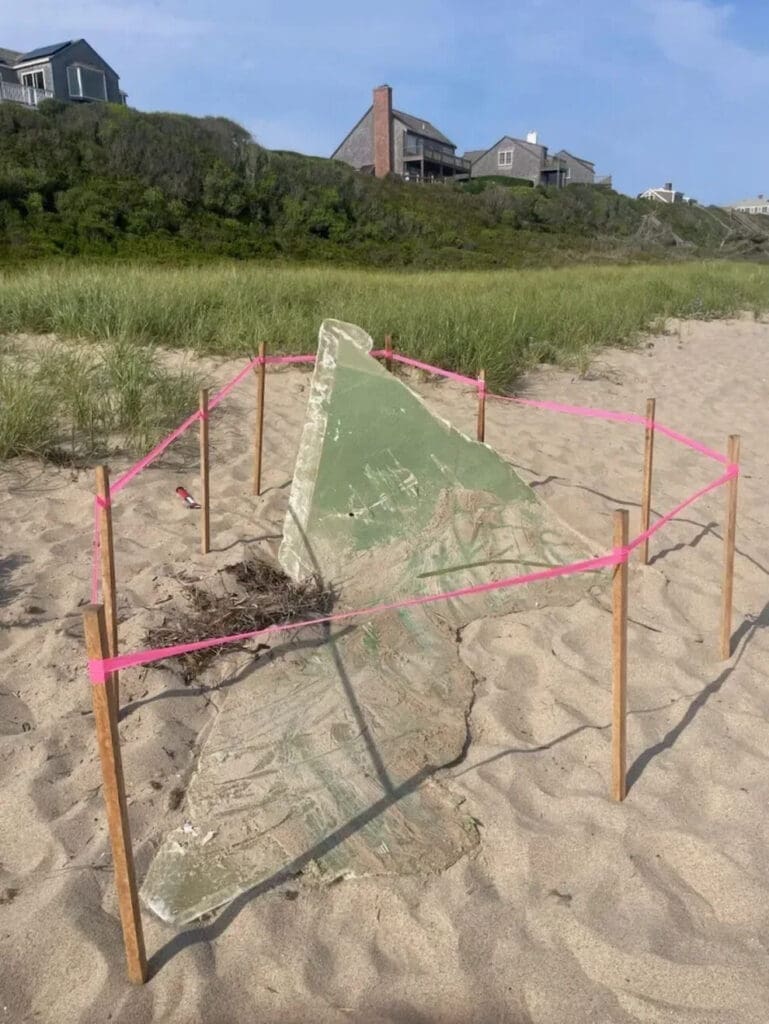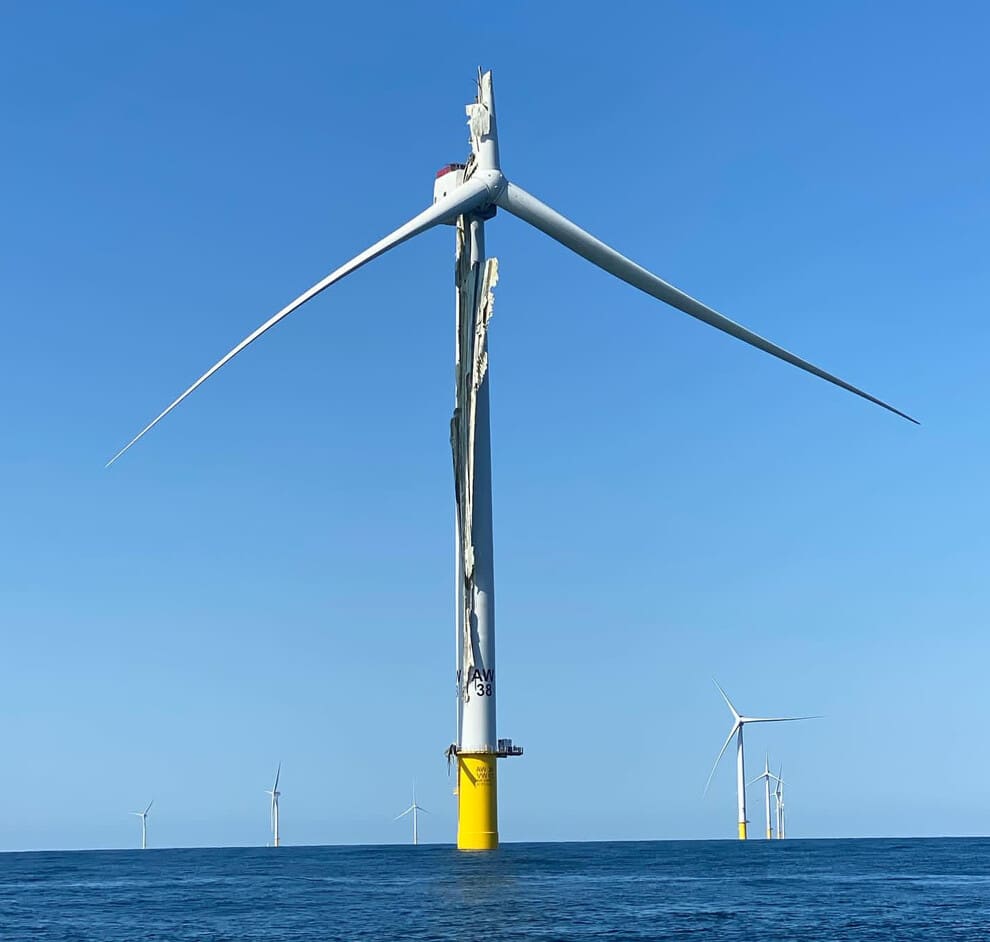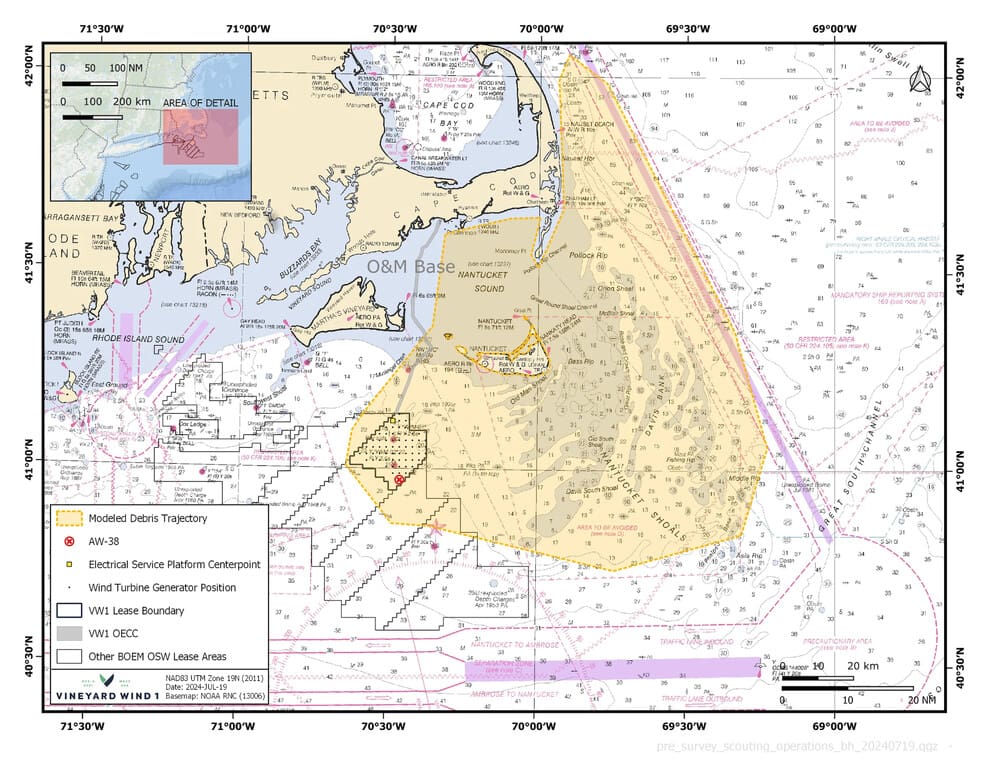Search Posts
Recent Posts
- Rhode Island Legislature Highlights Accomplishments for the 2025 Session June 25, 2025
- Sports in RI: Cody Tow, Volleyball Past, Present and Into His Future – John Cardullo June 25, 2025
- Need a Break? Time for Sour Grapes – Tim Jones June 25, 2025
- Rhode Island Weather Forecast for June 25, 2025 – Jack Donnelly June 25, 2025
- It is what it is: Commentary on 6.25.25 with Jen Brien June 25, 2025
Categories
Subscribe!
Thanks for subscribing! Please check your email for further instructions.

Report on Vineyard Wind, clean up – Nantucket Current. Wampanoag Tribe calls for moratorium
Reprinted with permission, Nantucket Current, by JohnCarl McGrady
We continue to update our readers on the developing situation on the beaches and waters of Nantucket as a giant blade on a Vineyard Wind turbine (1 of 19 operating of the planned 68), failed and came apart with part of the blade falling to the ocean floor and the rest splitting up into smaller and smaller pieces of insulation-like material, styrofoam and fiberglass, and showing up on the southern shores and beaches.
Also – the Wampanoag Tribe on Martha’s Vineyard calls for a national moratorium.
The Nantucket Current article on July 24th:
Initial Environmental Assessment Of Vineyard Wind Turbine Blade Failure Released
The report states the primary risk from the turbine blade debris is physical injuries to those coming in contact with it on public beaches in shoreline areas. It claims the debris is “inert, non-soluble, stable, and non-toxic,” comparing it to materials that can be found in such common items as textiles, boats, and the aviation industry. While there are no PFAS-containing materials used in the manufacturing of the blade itself, there are more than 200 “aerodynamic add-ons” attached to the root end of the exterior of the blade which contain PTFE – commonly referred to as Teflon – which is categorized as a type of PFAS by the Food & Drug Administration.

The report emphasizes that there is still much left to be determined and evaluated and that the initial assessment will continue to evolve with additional information.
“The report identifies further evaluations concurrent with continued debris recovery efforts to advance the overall Conceptual Site Model initial risk assessment outcomes, including… Expansion of the CSM consistent with standard planning and assessment activities for human health and ecological risk assessments, in terms of potential current and future receptors, exposure routes, and pathways.”
What is not mentioned in the report is any assessment of the environmental impact on marine life, as well as GE Vernova’s material safety data sheets, or MSDSs, for the blade materials. While the MSDSs were available to and used by Arcadis to draft the initial assessment, they were not included as an appendix.
“We hope to receive the MSDS (Wednesday) morning and will be sharing it with our residents as soon as we receive it,” said Florencia Rullo, the town’s communications manager.
The town shared the 11-page document just before 10 p.m. Tuesday night. It was paid for by GE Vernova, which hired Arcadis US, Inc., the engineering and environmental consulting firm, to complete the initial assessment.
Arcadis is the same firm the town of Nantucket hired to develop its Coastal Resilience Plan, as well as another project – a plan to manage the town’s response to erosion along the island’s eastern shoreline at Baxter Road. Arcadis also has a significant offshore wind energy consulting business.
The blade that “folded over” according to Vineyard Wind CEO Klaus Moller during the July 13th failure event was attached to GE Vernova’s Haliade-X 13-megawatt wind turbine – the largest in the world. The blade is 351 feet long and weighs over 57 tons. It consists primarily of fiberglass, semi-rigid foam, and polyester resins, among other substances that will be revealed in GE’s material safety data sheets.
“There are 33 different materials involved in the production of a turbine blade, from the most basic common household adhesives to the more complex industrial materials used to build the blade,” the report states.
With respect to the “aerodynamic add-ons” that contain PTFE, the report explains that “At least 67 of 240 add-ons are visible as attached to the blade, and additional add-ons may be present on parts of the blade that are not currently visible…Of the remaining 173 units, it is not yet possible to confirm how many remain adhered to the outer blade due to not only the folded section of the remaining blade piece. It is possible that some may have fallen from the blade, have landed either on the working platform of the tower or equally into the sea, and/or have already been collected in the debris from the shoreline or by the salvage vessels.”
The report states that Arcadis is coordinating with Resolve Marine, a maritime response and recovery company, on efforts to detach the remaining segment of the affected blade from the main turbine in coordination with Vineyard Wind, the Department of Interior’s Bureau of Safety and Environmental Enforcement (BSEE), and state and local officials.

___
The Nantucket Select Board on Saturday announced its intention to discuss potential legal action against Vineyard Wind as teams from the company and hired contractors – along with island residents – continued to clear debris resulting from its damaged turbine blade from south shore beaches and the waters around the island.
Nantucket resident Nathan Skerritt was fishing this morning along the south shore and documenting the fiberglass shards still washing up from Vineyard Wind’s damaged turbine blade, more than a week after its failure 15 miles southwest of the island pic.twitter.com/RoJ63OCI35
— Nantucket Current (@ACKCurrent) July 22, 2024
The Select Board’s meeting will be held in executive session on Tuesday. Executive session meetings are closed to the public to avoid potentially compromising the Town’s position by revealing legal strategies and other details.
Even as the potential for litigation comes into focus, the work on the ground and in the waters around Nantucket – recovering thousands of pieces of fiberglass and styrofoam – proceeded over the weekend, with debris found all over the island and as far away as Monomoy Island and the outer Cape.
On Sunday, Nantucket Harbormaster Sheila Lucey issued a warning about a large piece of Vineyard Wind turbine debris located near Madaquecham Beach.
“It will cause a hazard to mariners and beach patrons,” Lucey said. “All mariners and swimmers please take warning and avoid this area.”
Following that report, Vineyard Wind stated that its beach crews were dispatched to the area along with a helicopter to observe the area from above.
Additional debris has been found by island fishermen northeast of Nantucket, approximately 50 miles from the Vineyard Wind lease area. Jon Lake and Elliot Sudal were in a boat east of Great Point when they picked up pieces of the damaged turbine blade on Sunday.

On Saturday, the Chatham Harbormaster reported debris from the damaged GE Vernova wind turbine blade that was located 3.5 miles southeast of Monomoy Island. Vineyard Ward stated that nine vessels were immediately dispatched to the area, and the debris was recovered at approximately 4:30 p.m.
Vineyard Wind announced Saturday that it had increased its presence on the island to over 50 people, including contractors it has hired from the Robert B. Our Company. Team members have also begun to collect debris from Tuckernuck and Muskeget, the company said, although some Tuckernuck property owners disputed that and said that process has not yet begun. The company also has three vessels in the waters around Nantucket monitoring for debris and attempting to collect pieces when found.
Vineyard Wind communications director Craig Gilvarg stated “significant” progress had been made in the recovery effort.

This is the US Coast Guard drift model of the projected debris field from the destroyed Vineyard Wind turbine blade, nearly one week since the incident happened.
“Many of our team members have been out in the Nantucket community for the last several days, either collecting debris or connecting with affected residents. We are still working to clean the beaches and remain committed to working with the community to address this situation,” Vineyard Wind CEO Klaus Skoust Møller said in a press release. “We will provide timely and useful information on recovery efforts. As we continue to make progress, we are grateful to town officials for coordinating resources and for their ongoing support as work to fully clean up Nantucket’s beaches.”
Vineyard Wind is working on a way to process financial claims, but it is not yet available.
State and federal agencies are now involved with crisis management efforts and Massachusetts Secretary of Energy and Environmental Affairs Rebecca Tepper is expected to brief the Town on state efforts next week.
Despite stating the debris is non-toxic, Vineyard Wind is advising island residents that “only its employees, contractors, or those appointed by town officials should handle and recover debris materials.”
If debris is found by members of the public they are advised to immediately contact Vineyard Wind’s reporting hotline: 833-609-5768. Reports of debris can also be sent directly to the cleanup contractor at this link: Recon Survey (NRCC) (arcgis.com).


___
Also, the Martha’s Vineyard Times reports the Wampanoag Tribe is calling for a national moratorium on offshore wind development:
“In the aftermath of a broken turbine blade off the Vineyard’s coast, the Wampanoag Tribe of Gay Head (Aquinnah) is calling for a moratorium on all offshore wind development in the United States until further research can be done on the impact of wind farm construction.
Aquinnah Wampanoag chairwoman Cheryl Andrews-Maltais said, “The ingestion of these materials by marine mammals could lead to serious health issues and disrupt the delicate marine ecosystem,” her letter stated. “Additionally, the presence of fiberglass fragments in the water poses a threat to shellfish, which are a crucial part of both the marine food web and also ingested by humans. The potential contamination of shellfish with fiberglass and other materials could have severe consequences for human consumption and public health.”
This is a developing story – with thanks to Nantucket Current for their continued coverage.

They speak of diversity on all (political) levels …. which is an honorable thing … especially with elderly, disabled and lil’ kids, but more EXPLORATION should be had among all major energy sources for the ecology and economy …..
That’s just the tip of the iceberg. From the building of these monsters to the gasses they use to cool the motors, which releases warm water back into the ocean, to them running has already threatened our precious ecosystem.